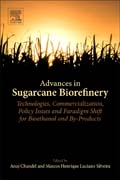
Advances in Sugarcane Biorefinery: Technologies, Commercialization, Policy Issues and Paradigm Shift for Bioethanol and By-Products
Chandel, Anuj K
Luciano Silveira, MarcosHenrique
Advances in Sugarcane Biorefinery: Technologies, Commercialization, Policy Issues and Paradigm Shift for Bioethanol and By-Products, by Chandel and Tomé, compiles the basic and applied information covering cane and biomass processing for sugar and ethanol production, as well as by-products utilization for improving the economy of sugarcane biorefineries. In this unique collection of 14 chapters, specialists in their field provide critical insights into several topics, review the current research, and discuss future progress in this research area. The book presents the most current advances in sugarcane biorefinery, including sugarcane crop cultivation, new sugarcane varieties, soil health, mechanization of crop, technical aspects of first and second generation ethanol production, economic analysis, life cycle assessment, biomass logistics and storage, co-generation of heat and electricity, process intensification and alternative by-products utilization. The book also explores the business ecosystem of sugarcane biorefineries, marketing analysis of ethanol demand and price dwindling patterns, aiming for a futuristic scenario. This book will be especially useful for scientists, researchers and technicians who are working in the area of biomass based biorefineries, as well as professionals in the sugar and alcohol industry. It also brings relevant content for policy makers, market analysts, agriculture scientists and managers. Presents technological updates on biomass processing, system biology, microbial fermentation, catalysis, regeneration and monitoring of renewable energy and recovery processesIncludes topics on techno-economic analysis, life cycle assessment, sustainability, markets and policyExplores the future potential of biorefineries with zero or near zero waste, and the potential of valorization of all by-products, including alternatives to current applications and the management of a large amount of residues INDICE: 1. Technological advancements for improved sugarcane cultivation, new varieties, pest and disease management, soil mapping and restoration of soil health 2. Sugarcane crop mechanization and straw recovery, Sugarcane management and enterprise resource planning (ERP) Systems, New maintenance technologies in agricultural processing and logistic, storage of sugarcane and residues 3. Sugarcane vinasse, molasses, yeast cream: Agricultural, environmental and industrial aspects 4. New frontiers in technological advancements in 1G ethanol production and recovery of by-products based on the biorefinery concept 5. Recent progress on bioconversion of hemicellulose into ethanol and value-added products, research developments of genetically modified organisms (GMOs) for hemicellulose sugars utilisation and commercialisation trends by new start-up companies 6. Second generation ethanol production: Potential biomass feedstock, engineering of feedstock, engineering of microorganisms for improved cellulose and ethanol production, Biomass deconstruction, process configurations and new process schemes, Techno-economic analysis 7. Carbon footprints scenario of burning gasoline, GHG emissions, climate change, comparative assessment with using ethanol as a transportation liquid fuel, IPCC recommendations 8. Comparative techno-economic analysis of co-generation of heat and electricity and second generation ethanol production from sugarcane biomass: measuring the right scale 9. Valorization of by-products following bio-refinery concept, commercial aspects of by-products of lignin and hemicellulose, cell wall components of sugarcane bagasse and straw 10. Global production statistics of ethanol, commercialization, marketing trends, investing opportunities appraisal on rules and regulations to international transport ethanol 11. Opportunities for investment, stake holders, futuristic market growth and market penetration strategies for new investors, virtual alcohol demand in potable sector, pharmaceutical sector and other industrial sectors 12. Government policy analysis, price control, subsidies, private investments and alcohol transportation, distribution and storage 13. Strategic execution of India-Brazil sucro-alcohol business network: Next five years overview on competitive marketing, mapping, and alignment of goals 14. Life cycle assessment of sugarcane biorefinery: Energy use, economic, environmental assessment and other sustainability indicators
- ISBN: 978-0-12-804534-3
- Editorial: Elsevier
- Encuadernacion: Rústica
- Páginas: 400
- Fecha Publicación: 01/09/2017
- Nº Volúmenes: 1
- Idioma: Inglés
